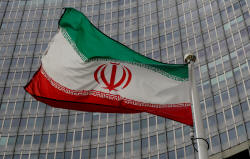Iran says U.S. to lift oil sanctions, Germany cautious on matter
 Send a link to a friend
Send a link to a friend
 [June 23, 2021] By
Parisa Hafezi and Humeyra Pamuk [June 23, 2021] By
Parisa Hafezi and Humeyra Pamuk
DUBAI/BERLIN (Reuters) -Iran said on
Wednesday the United States had agreed to remove all sanctions on Iran's
oil and shipping, although Germany cautioned that major issues remained
at talks between Tehran and world powers to revive a 2015 nuclear deal.
The Iranian remarks, by outgoing President Hassan Rouhani's chief of
staff, echoed previous assertions by officials in Rouhani's pragmatist
camp that Washington is prepared to make major concessions at the talks,
under way since April in Vienna.
The talks adjourned on Sunday for a break, two days after Iran held a
presidential election won by hardliner Ebrahim Raisi, the Iranian
judiciary chief who is on a U.S. blacklist. Raisi is due to replace
Rouhani in August.
"An agreement has been reached to remove all insurance, oil and shipping
sanctions that were imposed by (former U.S. President Donald) Trump,"
Rouhani's chief of staff Mahmoud Vaezi was quoted as saying by Iranian
state media.

Like other Western and Iranian negotiators who have said the talks
remain a long way from conclusion, German Foreign Minister Heiko Maas
said on Wednesday that Tehran and the powers still had to overcome
significant hurdles.
"We are making progress but there are still some nuts to
crack," Maas told a joint news conference with U.S. Secretary of
State Antony Blinken. Maas said a deal was possible even after the
election of Raisi, an implacable critic of the West.
U.S. National Security Adviser Jake Sullivan said on Sunday there was
still ďa fair distance to travelĒ, including on sanctions and on the
nuclear commitments that Iran has to make to salvage the tattered deal.
[to top of second column] |

An Iranian flag flutters in front of the International Atomic Energy
Agency (IAEA) headquarters in Vienna, Austria, September 9, 2019.
REUTERS/Leonhard Foeger/File Photo

Iran agreed in 2015 to curbs on its uranium enrichment programme, a possible
pathway to nuclear weapons, in return for the lifting of international
sanctions. Trump abandoned the agreement three years later, calling it flawed to
Iran's advantage, and reimposed harsh sanctions that hammered Iran's economy.
Tehran responded by violating some enrichment limits, while continuing to insist
that it has no nuclear arms ambitions.
Iranian and Western officials alike say Raisiís ascendancy is unlikely to alter
the Islamic Republicís negotiating position, as clerical Supreme Leader
Ayatollah Ali Khamenei already has the final say on all major policy.
Vaezi said the United States had agreed to take some senior Iranian figures off
a blacklist.
"About 1,040 Trump-era sanctions will be lifted under the agreement. It was also
agreed to lift some sanctions on individuals and members of the supreme leader's
inner circle."
U.S. President Joe Biden's administration aims to restore the deal, but the
sides disagree on which steps need to be taken and when to defuse mutual
suspicions and ensure full compliance.
But some Iranian officials have suggested Tehran may prefer an agreement before
Raisi takes office to give the new president a clean slate and avoid blame if
problems subsequently arise.
(Reporting by Parisa Hafezi in Dubai and Humeyra Pamuk in BerlinEditing by Mark
Heinrich)
[© 2021 Thomson Reuters. All rights
reserved.] Copyright 2021 Reuters. All rights reserved. This material may not be published,
broadcast, rewritten or redistributed.
Thompson Reuters is solely responsible for this content. |